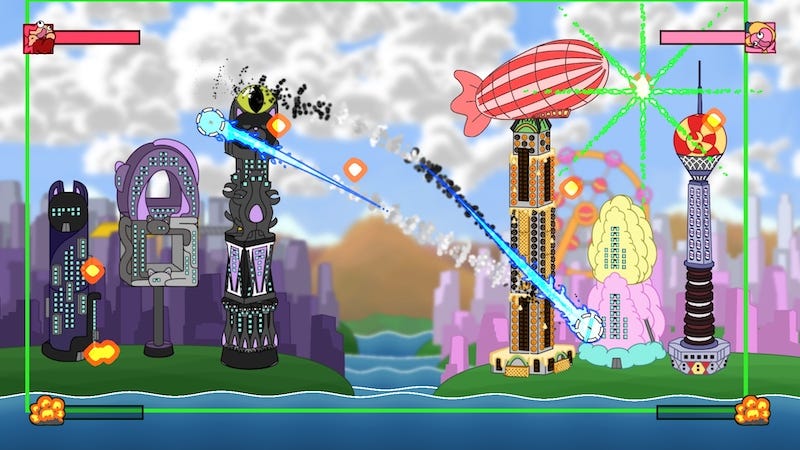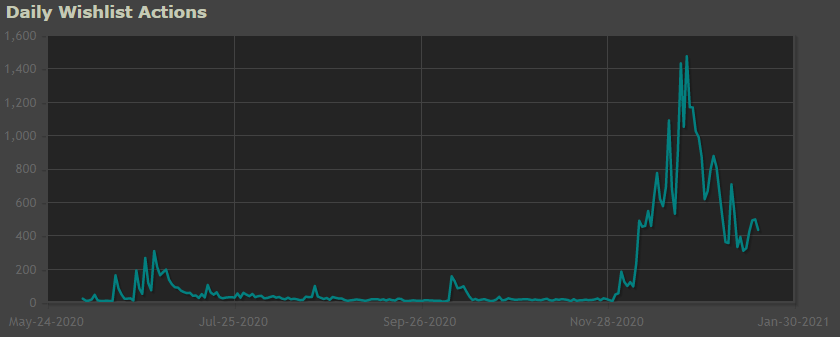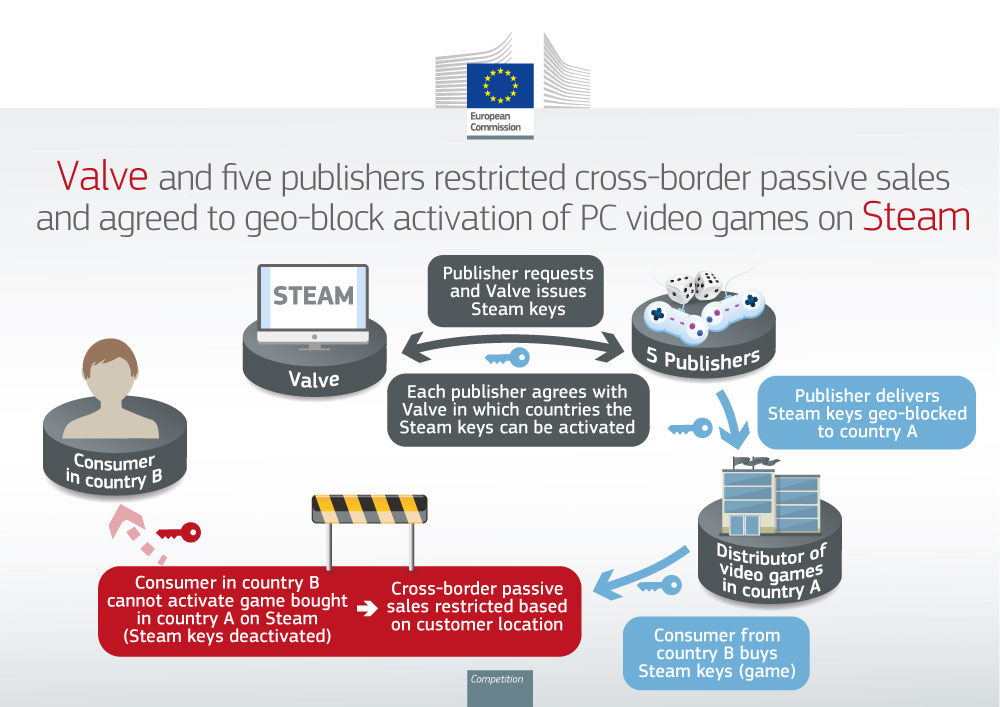Trending
Opinion: How will Project 2025 impact game developers?
The Heritage Foundation's manifesto for the possible next administration could do great harm to many, including large portions of the game development community.

Featured Blog | This community-written post highlights the best of what the game industry has to offer. Read more like it on the Game Developer Blogs or learn how to Submit Your Own Blog Post
We’ve been discussing Steam prologues again - you know, those things where you take a short excerpt of your game and launch it on a completely separate Steam page, but link back to your actual game’s page? Are they a big booster of interest?

[The GameDiscoverCo game discovery newsletter is written by ‘how people find your game’ expert & GameDiscoverCo founder Simon Carless, and is a regular look at how people discover and buy video games in the 2020s.]
Time for our second free GameDiscoverCo newsletter of the week. The lead subject for this one originates from a conversation on the GameDiscoverCo Plus subscriber-exclusive Discord server (psst, sign up for access!)
We’ve been discussing Steam prologues again - you know, those things where you take a short excerpt of your game and launch it on a completely separate Steam page, but link back to your actual game’s page? Are they a big booster of interest? Let’s try to find out…

The trend for prologues really hit big by April or May of 2020, when I noted that 4 of the 8 ‘New & Trending’ games on Steam were free prologues. This was part of a wider GameDiscoverCo musing on demos and prologues, which included a picture of Larry David shrugging as my conclusion. (We’re nothing if not professional around here.)
Hype around the prologue concept has calmed down marginally since then. But at the time, titles like Fly Punch Boom! (pictured, from Jollypunch Games) were noting what they felt like were the advantages. The devs said: “1 week of [prologue] launch in numbers: - 20K+ unique players - 100+ good reviews - thousands of wishlists on full game - 5K peak daily players - quickplay always full.”
But let’s get to the hangover. While the ‘First Impact!’ prologue/demo version has 445 Very Positive Steam reviews, the full game itself only has 62 Steam reviews since its debut in May 2020. So that’s probably 2-3,000 copies sold. Not sure if this is a disappointment to the game’s solo dev - but possibly so, after such a successful prologue.
How the heck do we separate all these anecdotal examples into some kind of clear message re: whether prologues and demos are helping or hindering games, though? Well, we gathered partial info for prologues that also have the full version of the game out there, and here’s the data we came up with:

We looked at the Steam prologue’s release date, its number of reviews and then the release date and the number of reviews for the full game on Steam. (You can multiply the full version’s reviews by 20-60 to guesstimate sales. And we recently speculated there’s around 100 actual players per review for prologues.)
For a bonus, here’s the top Steam prologues we found by # of reviews, including those that hadn’t come out yet. (We probably missed some, because many don’t use the word ‘prologue’ in them):

Anyhow, here’s what we think of prologues in 2021:
Firstly - releasing a prologue version of your game after the full version is already out in order to ‘juice’ sales seems like a marginal tactic. There’s a couple of examples here (Fantasy General II and Rising Hell) which perhaps led to 5 extra Steam reviews, if you look at the Steam review graphs for the main game. But no massive spike at prologue release time.
Those who are careful about what content they give out in a prologue (or demo!) have a better ‘prologue review to final game review’ ratio. You can see that in titles like Train Station Renovation (woo, PlayWay!) and even Summer In Mara (which had game expectation/quality issues, but nonetheless…) These titles offer just a few minutes of gameplay and it genuinely feels like a teaser.
Conversely, there are games that are casually fun/entertaining to play, but don’t have a lot of in-game progression. They can rack up a lot of prologue players, but from a group less likely to buy the full game. The ‘casual fun’ issue is what I think happened with Fly Punch Boom! But oddly, I don’t believe it significantly affected the game’s sales negatively or positively. It just frontloaded casual players.
You can also give away a bit too much of the game. For example, Dreamscaper’s prologue says it has 4-6 hours of unlockable content. That’s really a little bit too much for our liking, and may contribute to people saying ‘I enjoyed this, but I got my fill!’ On the other hand, you can argue that the prologue going ‘viral’ with almost 2,000 reviews added interest that wouldn’t have otherwise existed. Nonetheless, its prologue to full release ratio isn’t great.
Ultimately, this whole conversion is very chicken-and-egg like. We can’t A/B test for a situation where there was no prologue. So we don’t really know the difference between having one and not having one.
All we can conclude is: we don’t think player downloads of prologues are a major source of high quality wishlists, at least not compared to e.g. streamers. But since streamers can also play your demos, we still do think having them available for limited times at Steam Festivals is a good tactic.
Then, they can get both Steam feature interest and possible streamer pick-up, but in a more focused manner. So yep, we think the short, sharp playable demo/prologue - in both content and duration of availability - is the best bet. But.. this isn’t always the case, and the devs of The Riftbreaker, which has had a super popular prologue, would disagree with us.
Finally, if you’re clever, you can find a twist on the regular prologue that breaks through. GameDiscoverCo Plus subscriber Emil Stidsholt recently helped launch a prologue for his company’s upcoming game Rubber Bandits. He noted: “I'd followed the prologue discourse the past year and decided to do it with a bit of a twist - a holiday theme.”
For the ‘Xmas Prologue’ spin on this Gang Beasts-style brawler (hot genre, btw!), the team at Flashbulb Games made three quick Christmas-themed levels, some festive weapons, and five Xmas-themed skins (the fifth of which is unlocked if you wishlist the main game.)
The team had earlier participated in both the Summer and Fall Steam Festivals with a regular demo of Rubber Bandits, which wasn’t great on the wishlist side. But this worked amazingly - check out the Steam wishlist spike for the main game:

The reason? Flashbulb has millions of views on their game’s "Christmas Prologue" on YouTube, and even some very large Twitch streamers picked it up briefly (xQc, for example.) Just the kind of publicity you’re looking for.
Sure, a decent chunk of these wishlists will be lower quality, especially with the Xmas skin incentive. But that’s no reason not to get them, and this was a smart way to break through into streamer consciousness for the full game. (BTW, I’m now eagerly awaiting your Halloween prologues for 2021, since Halloween is my favorite holiday!)

And we’re not done yet. There’s a new U.S. President (and actually a competent one, hurray!), and a whole bunch of extra game discovery news for you all to peruse. And let’s start out with the intriguing European Commission ruling illustrated above:
As I noted on Twitter about the €7.8m EU fine for Valve & five publishers: “1. Valve provided geoblocked Steam activation keys to big publishers for free 2. European Union not happy 3. Valve refused to co-operate with the EU investigation 4. Valve got fined more $ than most of the pubs who asked them to do it? Oops.” Valve’s statement on it notes that this investigation into digital activation keys for physical PC retail games started in 2013 (!) & Steam stopped it in 2015. Valve disagrees and will appeal. There’s a newsletter’s worth of possible analysis here - big tech vs. government ‘fairness’ oversight is the story of the next decade, right?
Love the latest Joost Van Dreunen ‘Superjoost’ newsletter on the rise of recurring revenue in games. It gets to the heart of ‘subscriptions eating the mid-market’ that we’ve been talking about at GameDiscoverCo, and may be the story of the next few years in non-F2P games. Topics include the ‘game publisher as TV network’ concept, and the note: “The major challenge among game makers when it comes to subscriptions is the anxiety to disappear in a content buffet.” Please read?
Need to keep up with deadlines for all those virtual game conferences, showcases, and suchlike? The kind folks at Akupara Games have the Indie Calendar Buddy website running, which looks like an internal database that they’ve handily made external. Even comes with a Google Calendar option, if you want to not miss out on game/project submission deadlines or event timings for everything from the IGF to the Unfold Game Awards.
Talking of which, notable narrative game Steam festival LudoNarraCon now has its call for talk & game submissions open until February 5th. (We covered some of the results from last year’s event in a data-filled Q&A with organizer Fellow Traveler in May 2020: “Games that were unreleased saw an average of 3,000 increase in their wishlist balance during the LudoNarraCon weekend. Demos averaged 4,624 activations.”)
Continuing the ‘government vs. big tech’ flavor in the game space, I didn’t notice how harsh the language of the U.S. Federal Trade Commission ruling on Tapjoy’s ‘middleman misconduct’ was, in terms of general anti-monopolist/middleman sentiment: “We should all be concerned that gatekeepers can harm developers and squelch innovation. The clearest example is rent extraction: Apple and Google charge mobile app developers on their platforms up to 30 percent of sales… developers and small businesses risk severe retaliation for speaking up, including outright suspension from app stores – an effective death sentence.” More to come, perhaps? (Thx, Superjoost!)
Microlinks: the Wings Fund crew compiled a number of links on making the perfect video game pitch; results for linking a QR code for the mobile version of a game from its Epic Games Store PC version title screen; can you make a living from small games on Steam?
Microlinks pt.2: Activision Blizzard’s Battle.net 2.0 is looking even more like a publisher-exclusive version of platforms like Steam; Bohemia Interactive (Arma 3, DayZ) has a year-in-retrospect blog for 2020 which reveals sales numbers for the two games - 1.1 million and 1.3 million respectively, plus more DLC/active player data; some Steam back-end data for sales/revenue for a couple of smaller indie games - Mardek & Memody: Sindrel Song.
Finally, is the latest twist on the Switch pricing conundrum to launch with a big discount out of the gate? I really don��’t think that it’s sound tactics for most games - you can pick up your hardcore fan purchases at full price, and discount later.
But we’re seeing the Switch version of twin-stick shooter Bezier (trailer below) debut at 75% off ($4.99 instead of $19.99), and former Apple Arcade exclusive Down In Bermuda launching at 60% off ($7.99 instead of $19.99.) Perhaps in this crowded Switch market, emergency measures seem necessary?
[We’re GameDiscoverCo, a new agency based around one simple issue: how do players find, buy and enjoy your premium PC or console game? You can subscribe to GameDiscoverCo Plus to get access to exclusive newsletters, interactive daily rankings of every unreleased Steam game, and lots more besides.]
Read more about:
Featured BlogsYou May Also Like